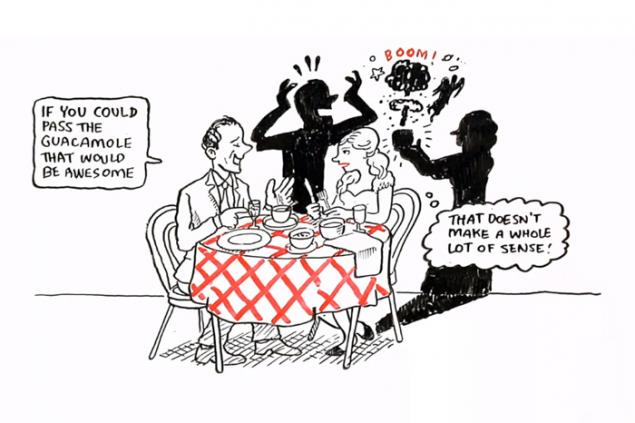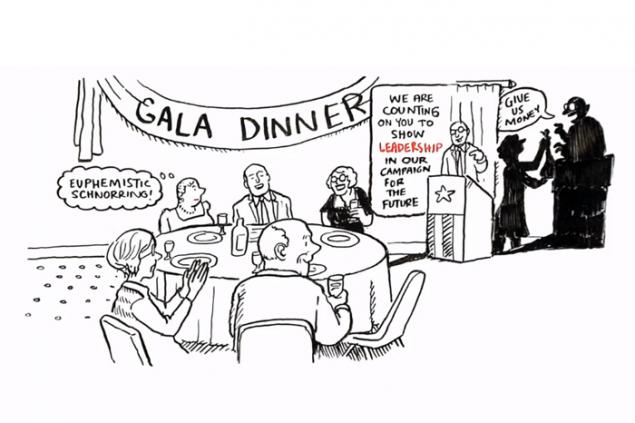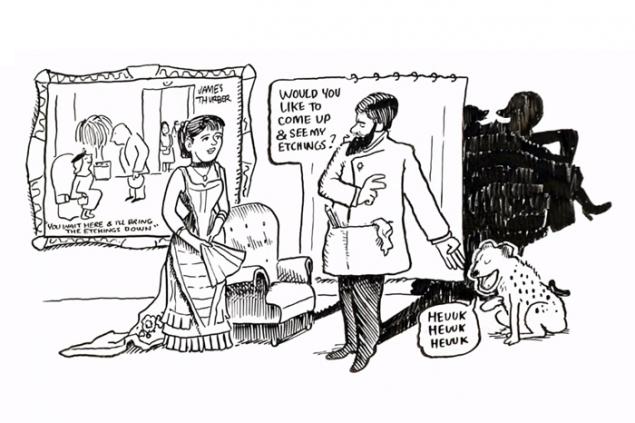833
What I mean: Steven Pinker — about why we so often say hints
In the beginning of the movie "Fargo" there is a scene where the thief is lucky the victim tied to the back seat of the car. Unfortunately, he stopped by the police because he does not offer. A police officer asks to see my driver's license, the driver holds out a wallet with documents and unobtrusive sticking with a $ 50 bill and said, "I guess it's better to solve this question on the spot." Both the police and the audience perceive this as a hidden bribe. Linguists call such a situation an indirect speech act. We do not give out all at once, and talking evasively and hide their true intentions, hoping that the listener will understand our message. It's called insinuation. We often do so unconsciously.
For example, we say: "it Will be great if you pass the guacamole". In this out-of-context sentence makes no sense, however, we easily recognize it as a polite request.

Or, for example, this sentence: "We hope that you will actively participate in our campaign for the future". Anyone who's ever been to a charity dinner, you're familiar with this euphemism, they all mean one thing: "Give us money".

"Would you like to come up and see my etchings?" — the hint of sex is so trivial that in the thirties James Thurber drew a comic strip for the New Yorker magazine, where the lover says to his lady: "You sit here, and I'm currently prints will bring."

The question is, why are bribes, requests, begging, harassment and threats to disguise, because both sides know what it is actually. So, the language needs to perform two functions:
— It needs to convey content, for example, a threat, a request or offer.
— At the same time it needs to establish the type of relations between interlocutors.
The answer is that the language must be used on two levels. The speaker uses literal language to designate the most trustful and close relationship to the person. Hoping that the listener can read between the lines, the speaker voiced the proposal, which may not be compatible with the type of relationship in which they consist. Politeness — a simple example. So what's wrong with the phrase "it Will be great if you give me the guacamole"? Why talk about some of the theoretical conditions for dinner? The listener is likely to think that if the speaker has not lost his mind (should pass the guacamole, like everything will be cool), with the help of this phrase it conveys the necessary information. In this case, in this way he tries to show that in this request there is a hint of dominance that often accompanies requests — because in fact you command a person to do what you want.
According to anthropologist Alan Fiske, there are only three basic types of relationships in different cultures around the world. Each type requires a different way of distributing resources, each has different evolutionary bases, each more suited to certain individuals, but can be extended by negotiation, and here comes into play the language.
So, the first type is dominance, there is a reception "to me it is better not to communicate", we inherited from a system of hierarchies that are ubiquitous among primates. The second type is very different from the first community, its main principle is "share as brothers", he has evolved from kin selection and mutualism, therefore, applies by default to the spouses and close friends. Finally, the last type — a mutually beneficial relationship, "I, I", we use it in business to exchange goods and services.
People are not naive, they find it hard to believe that a grown woman can be fooled engravings. However, to offer to look at the engravings, it is more comfortable than to offer to have sex. So what's going on here? Why even the most ridiculous hint to say is much easier than to spread the truth? Behavior that are the norm within one type of relationship, can be a anomaly in the other. For example, at the party you do not hesitate to approach the husband or wife, friend or girlfriend and have shrimp on their plates, but you're not going to do this with my boss, because what seems perfectly normal in a relationship, community of type, absolutely does not work in domination. Also being rude, if at the end of a dinner party with friends you pull out of wallet and offer to pay. Although such an act is entirely appropriate in the restaurant. Here there is a clash of communal type relationship and mutually beneficial, when you pay for services. This is precisely the situation when everyone knows you're supposed to do.
In cases where both parties are confident that they are on the same page, miscommunication can lead to unpleasant emotions and put us in an awkward position. For example, an employee on the job can easily be trapped if they do not know how to contact the head. Maybe we should invite him for a drink after work? This uncertainty arises from the ambiguity of the relationship. Not always easy to determine, they are governed by dominance or friendship. Popular wisdom says that good friends do not need to conclude any business transactions, e.g. to sell each other a car. Price negotiations can ruin a relationship, because the behavior that is appropriate in a mutually beneficial type of relationship can put you in a deadlock when the community type.
But why do we still refer to the hints — even when everything is clear? For example, when the listener is known to the intentions of the speaker. People are not naive, they find it hard to believe that a grown woman can be fooled engravings. However, to offer to look at the engravings, it is more comfortable than to offer to have sex. So what's going on here? Why even the most ridiculous hint to say is much easier than to spread the truth? Let us recall the scene from the romantic Comedy "When Harry met Sally". In the beginning of the film Harry tells Sally directly on her sex appeal.
— Are you hitting on me? she says.
— What should I do? Well, I take that back.
— You can't take back his words.
— Why not?
Because you already said it.
Oh, my God, what are we to do now, maybe the cops will call? I already said it!
What is the psychological status of the open offers, which makes the situation much more awkward than an indirect hint? I think the key to this problem lies in the concept that economists and logicians call the collective knowledge they separate it from individual knowledge. Individual knowledge is when A knows X and B knows X. And the collective knowledge is when A knows X, B knows X, and A knows that B knows X and B knows that A knows X, and so on to infinity. And this difference has important implications.
For example, why freedom of Assembly is protected as a fundamental right of any democracy? Why political revolutions are carried out when a crowd gathers in the square to defy the dictator? But because when people were at home, all despised dictator, but no one knew that other people knew about it. It is necessary to gather all in one place, where everyone knows that everyone else knows that all the hate of a dictator, so once this knowledge gives them the collective power to put the authority of the dictator in question.
The insinuation Deliberate message of negative information given by the hint or secret.
Euphemism Neutral word or expression used to replace others that are considered obscene or inappropriate.
Aesopian language of Literary device allegory, intentionally masking thought or idea of the author.
Another example is the tale "the Emperor's New clothes", the story of collective knowledge. When the little boy shouted that the king is naked, he does nothing new said, even if they didn't see a king, they still knew he was naked. On the other hand, he changed their knowledge because the moment everyone found out that other people also know. And again it gave them the collective power to question the importance of the king through the medium of laughter. The moral is that the open expression is a great way of creating collective knowledge. So here's a hypothesis — not even very obvious, but indirect hints create personal knowledge, whereas direct speech provides collective knowledge that can both maintain the relationship and to destroy them.
So, if Harry said, "I don't want to see my etchings?", Sally refused, then Sally would know that she rejected an indecent proposal. But if Sally knows that Harry knows? She can talk like this: "Maybe Harry thinks I'm naive and do not understand." And does Harry know that Sally knows that he knows? He probably thinks, "Maybe Sally thinks I'm a fool." They do not share the collective knowledge and can maintain the appearance of friendly relations. But Harry said, "let's have sex." And Sally turns him down. Now Harry knows that Sally knows, they cannot maintain the appearance of friendship. Intuitively we are always afraid that, once having expressed openly, to take it back we will not be able.
Source: theoryandpractice.ru
For example, we say: "it Will be great if you pass the guacamole". In this out-of-context sentence makes no sense, however, we easily recognize it as a polite request.

Or, for example, this sentence: "We hope that you will actively participate in our campaign for the future". Anyone who's ever been to a charity dinner, you're familiar with this euphemism, they all mean one thing: "Give us money".

"Would you like to come up and see my etchings?" — the hint of sex is so trivial that in the thirties James Thurber drew a comic strip for the New Yorker magazine, where the lover says to his lady: "You sit here, and I'm currently prints will bring."

The question is, why are bribes, requests, begging, harassment and threats to disguise, because both sides know what it is actually. So, the language needs to perform two functions:
— It needs to convey content, for example, a threat, a request or offer.
— At the same time it needs to establish the type of relations between interlocutors.
The answer is that the language must be used on two levels. The speaker uses literal language to designate the most trustful and close relationship to the person. Hoping that the listener can read between the lines, the speaker voiced the proposal, which may not be compatible with the type of relationship in which they consist. Politeness — a simple example. So what's wrong with the phrase "it Will be great if you give me the guacamole"? Why talk about some of the theoretical conditions for dinner? The listener is likely to think that if the speaker has not lost his mind (should pass the guacamole, like everything will be cool), with the help of this phrase it conveys the necessary information. In this case, in this way he tries to show that in this request there is a hint of dominance that often accompanies requests — because in fact you command a person to do what you want.
According to anthropologist Alan Fiske, there are only three basic types of relationships in different cultures around the world. Each type requires a different way of distributing resources, each has different evolutionary bases, each more suited to certain individuals, but can be extended by negotiation, and here comes into play the language.
So, the first type is dominance, there is a reception "to me it is better not to communicate", we inherited from a system of hierarchies that are ubiquitous among primates. The second type is very different from the first community, its main principle is "share as brothers", he has evolved from kin selection and mutualism, therefore, applies by default to the spouses and close friends. Finally, the last type — a mutually beneficial relationship, "I, I", we use it in business to exchange goods and services.
People are not naive, they find it hard to believe that a grown woman can be fooled engravings. However, to offer to look at the engravings, it is more comfortable than to offer to have sex. So what's going on here? Why even the most ridiculous hint to say is much easier than to spread the truth? Behavior that are the norm within one type of relationship, can be a anomaly in the other. For example, at the party you do not hesitate to approach the husband or wife, friend or girlfriend and have shrimp on their plates, but you're not going to do this with my boss, because what seems perfectly normal in a relationship, community of type, absolutely does not work in domination. Also being rude, if at the end of a dinner party with friends you pull out of wallet and offer to pay. Although such an act is entirely appropriate in the restaurant. Here there is a clash of communal type relationship and mutually beneficial, when you pay for services. This is precisely the situation when everyone knows you're supposed to do.
In cases where both parties are confident that they are on the same page, miscommunication can lead to unpleasant emotions and put us in an awkward position. For example, an employee on the job can easily be trapped if they do not know how to contact the head. Maybe we should invite him for a drink after work? This uncertainty arises from the ambiguity of the relationship. Not always easy to determine, they are governed by dominance or friendship. Popular wisdom says that good friends do not need to conclude any business transactions, e.g. to sell each other a car. Price negotiations can ruin a relationship, because the behavior that is appropriate in a mutually beneficial type of relationship can put you in a deadlock when the community type.
But why do we still refer to the hints — even when everything is clear? For example, when the listener is known to the intentions of the speaker. People are not naive, they find it hard to believe that a grown woman can be fooled engravings. However, to offer to look at the engravings, it is more comfortable than to offer to have sex. So what's going on here? Why even the most ridiculous hint to say is much easier than to spread the truth? Let us recall the scene from the romantic Comedy "When Harry met Sally". In the beginning of the film Harry tells Sally directly on her sex appeal.
— Are you hitting on me? she says.
— What should I do? Well, I take that back.
— You can't take back his words.
— Why not?
Because you already said it.
Oh, my God, what are we to do now, maybe the cops will call? I already said it!
What is the psychological status of the open offers, which makes the situation much more awkward than an indirect hint? I think the key to this problem lies in the concept that economists and logicians call the collective knowledge they separate it from individual knowledge. Individual knowledge is when A knows X and B knows X. And the collective knowledge is when A knows X, B knows X, and A knows that B knows X and B knows that A knows X, and so on to infinity. And this difference has important implications.
For example, why freedom of Assembly is protected as a fundamental right of any democracy? Why political revolutions are carried out when a crowd gathers in the square to defy the dictator? But because when people were at home, all despised dictator, but no one knew that other people knew about it. It is necessary to gather all in one place, where everyone knows that everyone else knows that all the hate of a dictator, so once this knowledge gives them the collective power to put the authority of the dictator in question.
The insinuation Deliberate message of negative information given by the hint or secret.
Euphemism Neutral word or expression used to replace others that are considered obscene or inappropriate.
Aesopian language of Literary device allegory, intentionally masking thought or idea of the author.
Another example is the tale "the Emperor's New clothes", the story of collective knowledge. When the little boy shouted that the king is naked, he does nothing new said, even if they didn't see a king, they still knew he was naked. On the other hand, he changed their knowledge because the moment everyone found out that other people also know. And again it gave them the collective power to question the importance of the king through the medium of laughter. The moral is that the open expression is a great way of creating collective knowledge. So here's a hypothesis — not even very obvious, but indirect hints create personal knowledge, whereas direct speech provides collective knowledge that can both maintain the relationship and to destroy them.
So, if Harry said, "I don't want to see my etchings?", Sally refused, then Sally would know that she rejected an indecent proposal. But if Sally knows that Harry knows? She can talk like this: "Maybe Harry thinks I'm naive and do not understand." And does Harry know that Sally knows that he knows? He probably thinks, "Maybe Sally thinks I'm a fool." They do not share the collective knowledge and can maintain the appearance of friendly relations. But Harry said, "let's have sex." And Sally turns him down. Now Harry knows that Sally knows, they cannot maintain the appearance of friendship. Intuitively we are always afraid that, once having expressed openly, to take it back we will not be able.
Source: theoryandpractice.ru























